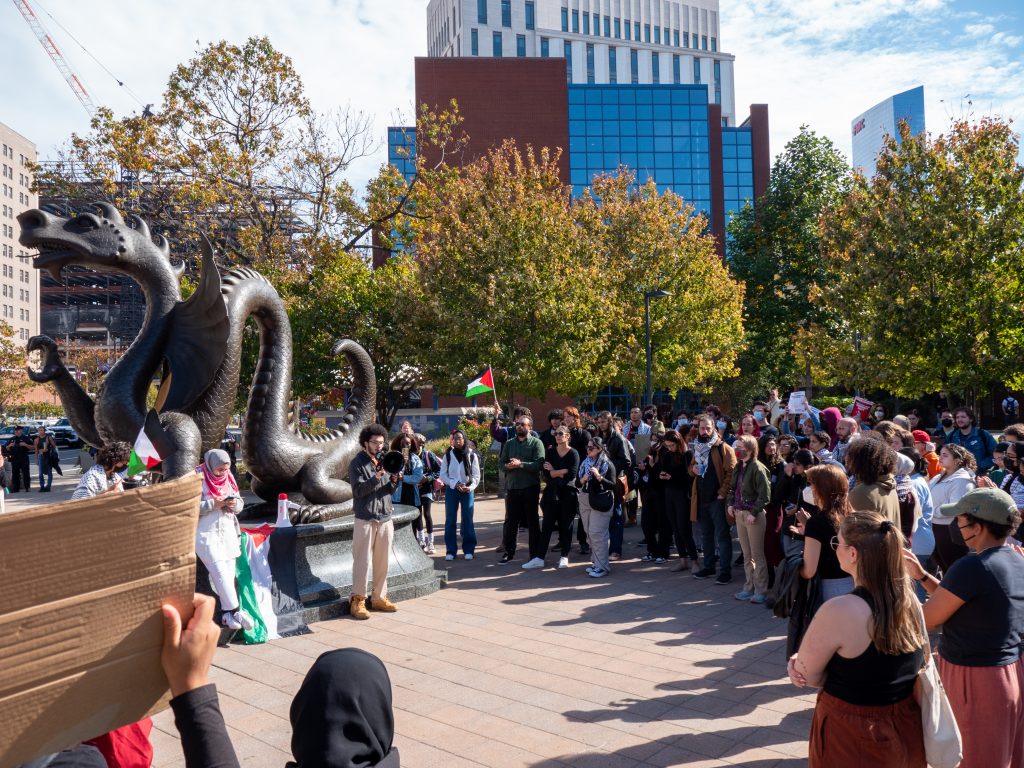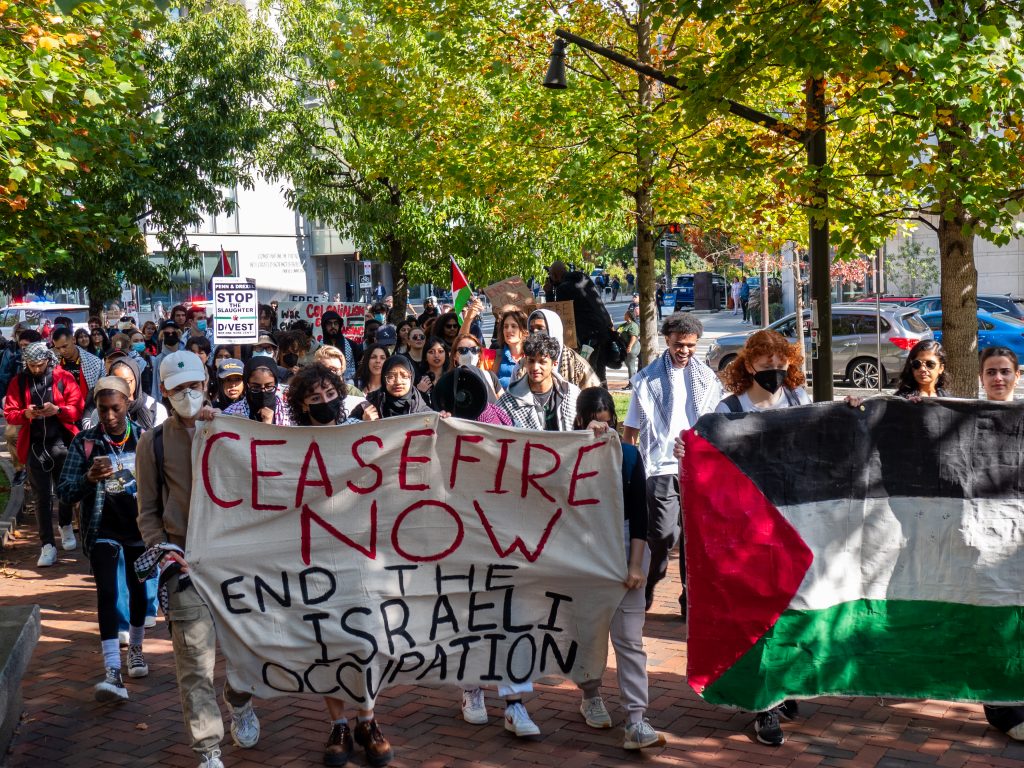
Students from Drexel University and the University of Pennsylvania walked out of class at noon on Oct. 25 to gather at the Dragon Statue in solidarity with Palestine and the people of Gaza. The walkout was organized by Drexel’s Students for Justice in Palestine as part of a larger “call for students and all sectors of society… to participate in a national walkout,” according to their Instagram account.
Along with “students all over the [US] from over 100 universities,” these demonstrators gathered to “condemn the siege on Gaza and condemn genocide and stand in resolute solidarity with Palestine.”
So far, Israel’s bombardments in Gaza have resulted in at least 8,796 casualties, including at least 3,648 children, according to Al Jazeera. Israel claims its actions are in response to Hamas’ attacks in southern Israel, which have resulted in at least 1,405 casualties, at least 1,020 of whom were civilians, along with 240 hostages whose status is currently unconfirmed.
Members of SJP and other student speakers aimed to highlight the role of university communities, especially Drexel and UPenn, in exacerbating the ongoing humanitarian crisis in Gaza. They claimed that “Penn and Drexel are both complicit in the genocide of Palestinians. Both universities trade with and invest in companies that aid the colonization of Palestinian land and the building of illegal settlements.”
They cited multiple companies, including Hewlett Packard Enterprise, Boeing and Lockheed Martin, which Drexel partners with for co-ops and other opportunities. Weapons manufactured by Boeing and Lockheed Martin supply over 70 percent of Israel’s arms purchases that come from the US, according to the Stockholm International Peace Research Institute. HP has been criticized for its role in the development of surveillance technologies deployed by Israel in the West Bank.

They further added that Drexel and Penn are “[complicit], whether it’s through the programs they have, their study abroad, [or] their refusals to even say the word Palestinian.” The latter referred to the statements made by John Fry, and other similar statements, which SJP and Drexel’s Muslim Student Association, along with other student organizations, considered to be exclusionary of Palestinian voices and neglectful of the grief of Muslim and Arab communities at Drexel.
After speakers made statements, approximately 200 demonstrators moved south from the Dragon Statue past the Papadakis Integrated Sciences Building and towards Penn’s Broken Button, making chants along the way. Drexel Police kept 33rd Street clear of vehicles until the group had passed.
A Penn student spoke about the challenges students supporting Palestine have to face, including being “threatened by harassment and doxing,” which she feels “the university has done nothing about.”
She expressed her determination despite these challenges and added, “I’m here as a student today and we know why we’re here. We’re here to hold our universities accountable. We’re here to demand an immediate ceasefire, divestment from our universities from companies continuing to fund this genocide, an end to the violent occupation and to free Palestine.”

Nada Abuasi, a graduate student at Drexel and a member of SJP, added to the previous student’s concerns, stating “Students aren’t even able to speak freely. There are people who have masked today because they know that there’s a risk that their faces will be kept on billboard signs with their names underneath.”
Trucks showing the names and faces of individuals who expressed support for Palestine have been spotted on the campuses of Harvard and Columbia.
Abuasi added that “Palestinian students can’t express their solidarity without being reprimanded or punished. People are worried that they’ll lose their scholarships, their job offers, their grad school offers. Palestinians and their allies are being monitored, surveilled and stopped by the institution and by so-called public safety officials.”
Abuasi also called out the media and journalists in the West as “a breeding ground for distorting narratives, for reinforcing power structures and asymmetry, and for perpetuating harmful narratives.”
She called the current coverage of demonstrations relating to Israel and Palestine “selective reporting” and “lousy journalism.”
When later asked by The Triangle about what specifically she felt the media was misrepresenting, she said “certain reporters purposely under-report the amount of support that Palestinians have… I would want you to look around [and] see how many people are showing up, people who aren’t Arab, people who aren’t Muslim, people who aren’t Palestinian who have come out and shown their support for Palestine.”
Abuasi underscored her concerns with the chant: “Every time the media lies, a neighborhood in Gaza dies.”
Previous protests and gatherings in support of Palestine in the Penn and Drexel communities saw little media coverage other than that of the Daily Pennsylvanian, Penn’s student newspaper, and The Triangle. Following calls for more comprehensive reporting across Philadelphia, at the Oct. 25 walkout there were reporters, photographers and film crews from multiple organizations including the Philadelphia Inquirer and Nieuwsuur, a Dutch television program.

